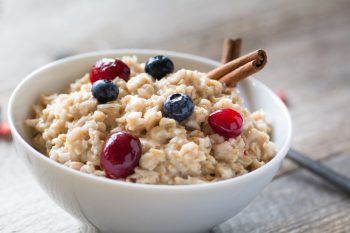
A new study has found that not only are whole grains effective in reducing risk of type 2 diabetes, but that some whole grains have a greater impact than others.
The study, published in the September issue of The Journal of Nutrition, used Danish Diet, Cancer, and Health data on a total of 55,465 participants (baseline age, 50-65 years). Researchers calculated whole-grain intake in grams per day, broken down by whole-grain cereal types (wheat, rye, and oats). During a median follow-up of 15 years, 7,417 participants were diagnosed with type 2 diabetes.
Learn what separates whole grains from refined grains, and why whole grains offer a “complete package” of health benefits https://t.co/HDZp60YPks @HSPHnutrition #WholeGrainsMonth pic.twitter.com/z3geTn4ebe
— Harvard T.H. Chan School of Public Health (@HarvardChanSPH) September 1, 2018
A daily intake of 16 grams of whole grains per day resulted in a 11% and 7% decreased risk of type 2 diabetes in men and women, respectively (hazard ratio [HR] men, 0.89; HR women, 093). Results held true for men regardless of the type of whole grain, but for women, the decrease was only significantly associated with wheat and oats. For both sexes, rye bread, whole-grain bread, and oatmeal/muesli all correlated with a lower risk of type 2 diabetes.
Whole grain may be beneficial for the health of our bowels, weight, blood sugar, cancer prevention, bones, brain, and heart. Watch the video "Whole Grains May Work as Well as Drugs" on https://t.co/ZgE3qD1kYd to learn more: https://t.co/CLqU1jq0DK pic.twitter.com/PkRXWn57F9
— Michael Greger, M.D. (@nutrition_facts) September 2, 2018
The study was conducted in Denmark, which gave researchers the unique opportunity to compare the benefits of different types of whole grains.
“Most studies similar to ours have previously been conducted in the USA, where people mainly get their wholegrain from wheat,” senior study researcher Rikard Landberg said. “We wanted to see if there was a difference between different cereals. One might expect there would be, because they contain different types of dietary fiber and bioactive substances, which have been shown to influence risk factors for type 2 diabetes.” https://twitter.com/bionewscentral/status/1037380832695119872
The positive benefits of a diet rich in whole grains surpass diabetes prevention.
“Our results are in line with dietary advice, which recommends switching out foods containing white flour for wholegrains,” according to Landberg. “You get extra health benefits – white flour has some negative effects on health, while wholegrain has several positive effects, beyond protection against type 2 diabetes.”
Read about the connection between diabetes and cancer.
Read about the effects of diabetes during pregnancy.
Sources: The Journal of Nutrition, EurekAlert







 © 2025 Mashup Media, LLC, a Formedics Property. All Rights Reserved.
© 2025 Mashup Media, LLC, a Formedics Property. All Rights Reserved.